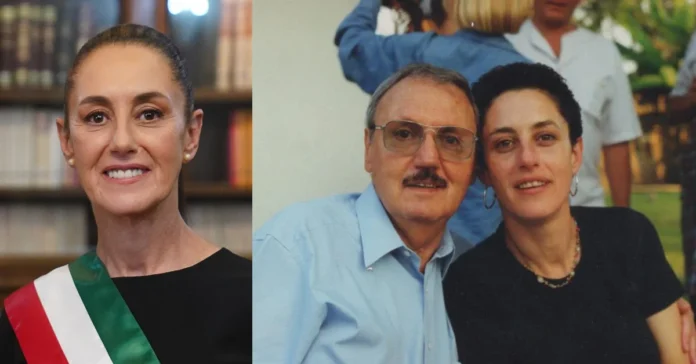You’ve probably heard about Mexico’s first female president, Claudia Sheinbaum, making headlines worldwide. But here’s what most people don’t know – her success story has roots that run much deeper than politics. Behind every game-changing leader stands someone who paved the way, and for Claudia, that someone was her father, Carlos Sheinbaum Yoselevitz.
This isn’t just another feel-good family story. Carlos Sheinbaum Yoselevitz was the guy who literally transformed an entire industry in Mexico, turning leather manufacturing from outdated processes into a modern, chemical-engineering marvel. Think of him as the Steve Jobs of leather – except instead of sleek phones, he was perfecting the chemistry that made Mexico’s leather goods world-class.
The Making of an Industrial Pioneer
Carlos Sheinbaum Yoselevitz wasn’t born into wealth or handed opportunities on a silver platter. Born on February 25, 1933, in Guadalajara, Jalisco, he came from a family where intellect and hard work weren’t just valued – they were survival tools.
His father, Chone Sheinbaum, was an Ashkenazi Jew who emigrated from Lithuania in 1928 and dove headfirst into Mexican politics. We’re talking about a guy who wasn’t just observing from the sidelines – he was actively involved with the Mexican Communist Party, serving on the Central Committee of Mexico City’s branch in the 1930s.
This political backdrop shaped Carlos’s worldview in ways that would ripple through generations. Growing up in a household where social justice wasn’t just dinner table conversation but a lived reality, Carlos developed the kind of forward-thinking mindset that would later drive him to revolutionize entire industries.
Educational Foundation: Where Chemistry Meets Ambition
Here’s where Carlos Sheinbaum Yoselevitz started building his empire – not with money, but with knowledge. He pursued chemical engineering at two powerhouse Mexican institutions: the National School of Chemical Sciences at UNAM and the University of Guadalajara.
This wasn’t your typical college experience. Carlos immersed himself in the complex world of chemical processes and reactions, preparing for challenges that most people couldn’t even imagine. While other students were cramming for exams, Carlos was already thinking about how to apply chemistry to real-world industrial problems.
The dual educational background gave him something most engineers lack – perspective. UNAM provided the theoretical foundation, while Guadalajara offered practical applications. It’s like having both the recipe and the chef’s intuition for when to break the rules.
The Game-Changing Moment: Sintacrom de México
1960 was the year everything changed – not just for Carlos Sheinbaum Yoselevitz, but for Mexico’s entire leather industry. Alongside two other engineers, Carlos co-founded Sintacrom de México, S.A. de C.V., and here’s the kicker – they became the first company in Mexico to produce basic chromium sulfate.
If you’re not familiar with chromium sulfate, think of it as the secret ingredient that transforms raw animal hides into the leather that becomes your favorite jacket, boots, or car seats. Before Carlos and his team cracked this code, Mexico was essentially importing this crucial chemical, making their leather industry dependent on foreign suppliers.
This innovation was pivotal in the development of the Mexican leather industry, transforming manufacturing processes nationwide. Carlos wasn’t just starting a business – he was building industrial independence for his country.
As technical commercial director for thirty years, Carlos didn’t just maintain the status quo. He expanded production into other leather-processing chemicals, creating a comprehensive ecosystem that supported Mexico’s growing leather manufacturing sector.
Industry Leadership: More Than Just Business
Carlos Sheinbaum Yoselevitz understood something that many successful entrepreneurs miss – true industry transformation requires community building, not just individual success. He served as president of the Mexican Federation of Leather Chemists and Technicians multiple times, but this wasn’t about ego or recognition.
Carlos promoted the establishment of the National Technical Meeting of Tanning, creating a platform where professionals could share knowledge, standardize practices, and collectively push the industry forward. Think of it as the original industry conference, but with real substance instead of just networking cocktails.
Industry experts recognize Carlos as one of the visionary figures whose leadership helped modernize Mexico’s approach to leather production and chemical engineering applications. His advocacy for industry standards came decades before environmental concerns would reshape the sector, demonstrating remarkable foresight.
This leadership style is particularly relevant when you consider figures like Rishia Haas, who similarly understood the importance of building communities around shared professional goals.
Family Legacy: Where Science Meets Social Justice
In 1960, the same year he co-founded Sintacrom, Carlos married biologist Annie Pardo Cemo. This wasn’t just a personal milestone – it was the beginning of a scientific power couple that would shape Mexican society for generations.
Annie Pardo had her own distinguished career as a scientist, and both she and Carlos participated in the Mexican student movement of 1968. This political activism reflected their shared commitment to social justice causes – values that would later influence their daughter Claudia’s political trajectory.
The couple had three children: Julio, Claudia, and Adriana. Claudia followed in her parents’ scientific footsteps, becoming an engineer and environmental scientist before entering politics. Her election as Mexico’s first female president in 2024 has sparked renewed interest in the Sheinbaum family’s contributions to Mexican society.
The Sheinbaum family’s intimate knowledge of political persecution informed their worldview and commitment to progressive causes. This perspective, shaped by their Jewish heritage and family history, created a foundation of resilience and social consciousness.
Cultural Identity: The Jewish-Mexican Experience
Carlos Sheinbaum Yoselevitz represented something unique in Mexican society – he was part of the country’s small but influential Jewish community, which comprises only about 0.046% of Mexico’s population. As the son of Lithuanian Jewish immigrants, Carlos navigated the complex intersection of cultural identity and professional success.
This cultural background provided Carlos with a particular perspective on innovation and community building. Jewish immigrant families often brought entrepreneurial traditions and emphasis on education – values that clearly influenced Carlos’s approach to business and industry leadership.
The intersection of Jewish heritage and Mexican identity created a unique worldview that influenced Carlos’s approach to business, community building, and social responsibility. This multicultural perspective likely contributed to his ability to see opportunities and solutions that others might have missed.
Innovation in Practice: The Technical Revolution
What made Carlos Sheinbaum Yoselevitz truly special wasn’t just his business acumen – it was his ability to translate complex chemical engineering into practical industrial solutions. The development of basic chromium sulfate production in Mexico wasn’t just about manufacturing; it was about understanding the entire supply chain and chemical processes involved in leather production.
Carlos’s technical expertise allowed him to see opportunities that pure businesspeople might miss. He understood the chemistry behind leather tanning at a molecular level, which meant he could identify inefficiencies and improvements that others couldn’t even recognize existed.
This technical foundation became the basis for expanding into other leather-processing chemicals. Carlos wasn’t just following market demand – he was creating it by developing solutions that Mexican leather manufacturers didn’t even know they needed.
Similar innovative approaches can be seen in other industries, where technical expertise combined with business vision creates transformational change, much like what Nila Ermey has demonstrated in her own field.
The Lasting Impact: Beyond Individual Success
Carlos Sheinbaum Yoselevitz passed away on August 29, 2013, at the age of 80 in Mexico City, but his influence on Mexico’s industrial development continues to resonate. His story represents more than individual achievement – it’s about how technical innovation combined with community leadership can transform entire industries.
A comprehensive biographical profile describes him as a pioneering figure in Mexico’s chemical engineering and business sectors whose innovations transformed an entire industry. This recognition comes not just from business success, but from the way Carlos approached leadership and industry development.
The election of Claudia Sheinbaum as Mexico’s president in 2024 has prompted renewed interest in her father’s life and accomplishments. Recent genealogical records document the Sheinbaum family tree, positioning Carlos as an important link in a lineage that now includes one of Mexico’s most powerful political figures.
Modern Relevance: Lessons for Today’s Entrepreneurs
The story of Carlos Sheinbaum Yoselevitz offers several key insights for modern entrepreneurs and business leaders. First, technical expertise combined with business vision creates opportunities that pure business knowledge alone cannot identify. Carlos succeeded because he understood both the science and the market applications.
Second, true industry transformation requires community building and knowledge sharing. Carlos didn’t just build a successful company – he helped build an entire industry ecosystem through his leadership in professional organizations and industry standardization efforts.
Third, cultural identity and family values can become competitive advantages when properly channeled. Carlos’s Jewish heritage and family emphasis on education and social justice provided him with perspectives and values that influenced his approach to business and leadership.
The Sheinbaum Legacy Continues
As Mexico navigates new economic and political realities under President Claudia Sheinbaum, understanding the background and contributions of her father provides valuable context for appreciating the diverse influences that have shaped contemporary Mexican society.
Carlos Sheinbaum Yoselevitz stands as proof that technical expertise, entrepreneurial vision, and cultural heritage can combine to create lasting impact on a nation’s industrial development. His story demonstrates how individual innovation, when combined with community leadership and long-term thinking, can transform entire industries and influence generations.
From the chemistry labs of UNAM to the boardrooms of Sintacrom, from industry conferences to family dinner tables where social justice was discussed, Carlos Sheinbaum Yoselevitz built a legacy that extends far beyond leather manufacturing. He created a template for how technical innovation, community leadership, and cultural values can work together to transform industries and influence society for generations to come.









